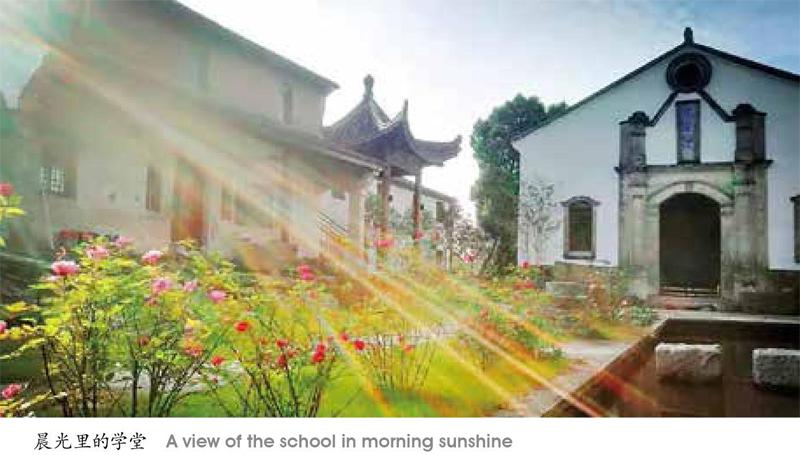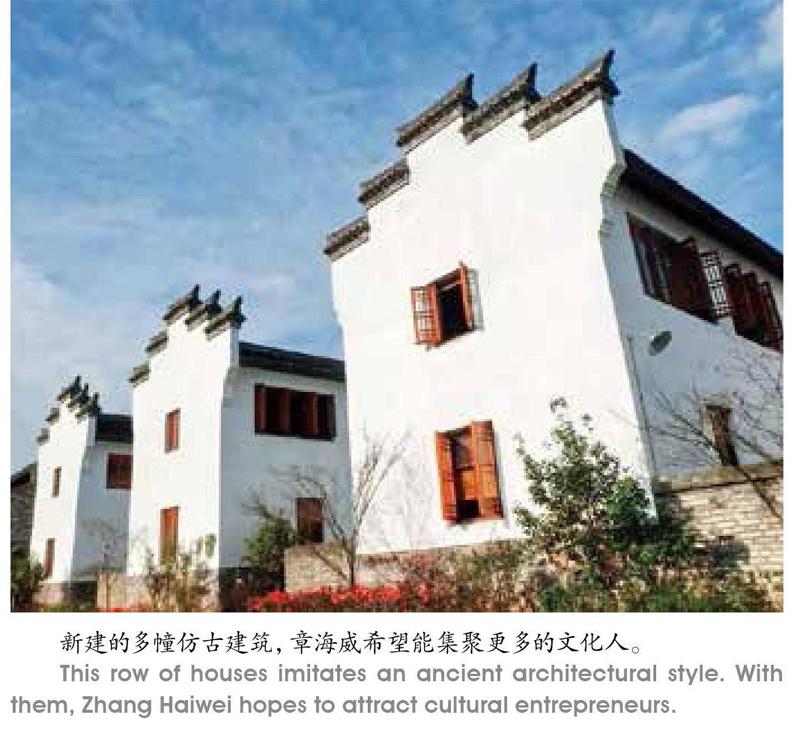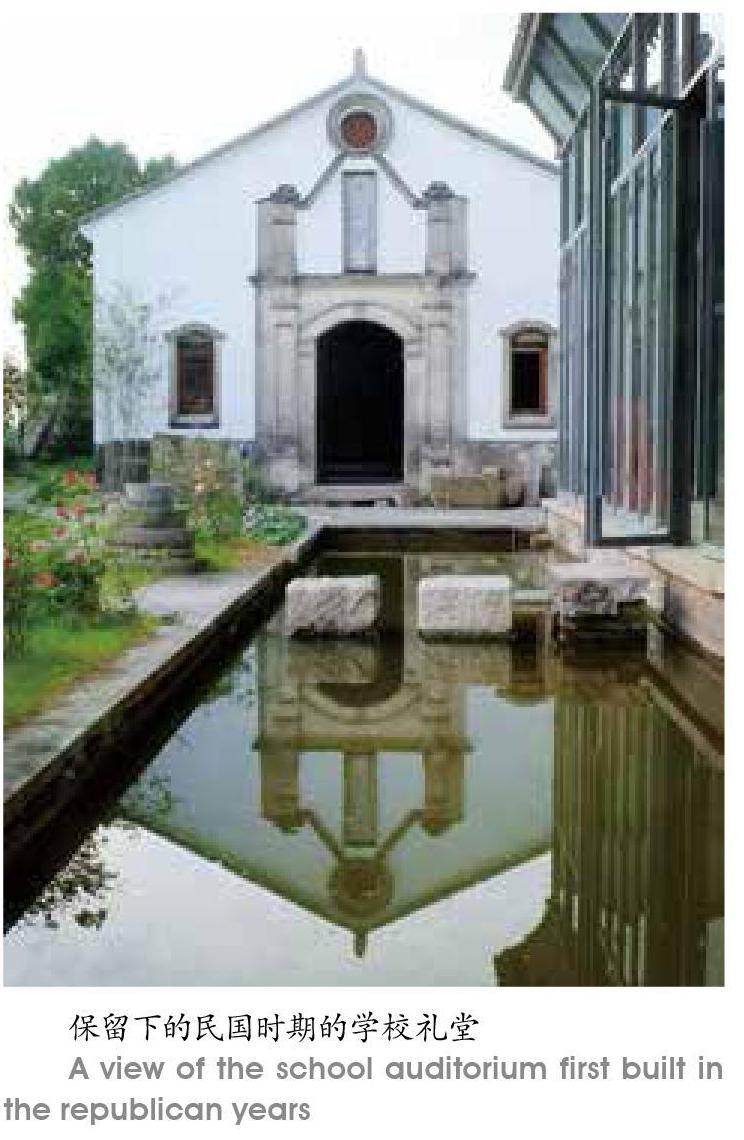大路章村:坚守乡村文脉延续的高地
2018-05-09史春波
史春波
80年前,乡贤捐地办学堂,培养出上百个大学生
现在,一位80后投入3000万元打造文化“聚贤庄”
浙江临海大路章村有一座其貌不扬的小山,因其形似古时候的笔架,所以被形象地称为“笔架山”。
春寒的二月,站在笔架山的山坡上,可以看到一片原野,有火车呼啸而过。铺地的铁轨,仿佛时空交错。
80年时代变迁,两代乡贤在这个村庄书写着不同的人生故事,相同的是理想和信心,是对中国农耕文明的自信,也是对传统文化的坚守。
早在1938年,两位章氏乡贤捐出了家中最好的60亩地,在山坡上建起一座新式学堂,从此,培养了一代代学人。
现在,这个人口1100多人的村庄,全村三分之一以上都是有正式工作的知识分子,有近十分之一的人从事教师职业。
“我算不上乡贤”,章海威摇摇手这样对我说,“只能算是热爱中国乡土文化的人”。
他穿着一双黑布鞋,黑色的羽绒服,简单朴素。
1983年,章海威出生在临海大路章村。和中国的许多村庄相比,这里的特别在于——文教兴盛。
9年前,乡村振兴的大潮还未来临,乡贤的力量支撑着章海威,开始了孤独而漫长的文化传承之路。
现代乡村的振兴,或许可以从这个村庄得到一些启示。
一个乡村的乡贤办学史
对这个笔架山,章海威是熟悉的。他小时候,就在这里读书,雖然成绩并不好,但那时,一颗种子已经播下。
近一个世纪前,章氏先贤们捐地办学的佳话,章海威从小听到大。
1938年,一个名叫章可久的乡贤,作为村里的第一代大学生,他辞去官职,回村里办学。
那时,章可久三兄弟有祖田180亩,大哥分去60亩地后,他和兄弟章可均将其中最好的60亩田地作为地基,以私人之力,建立了一所正规的新式小学,名为“振民小学”,后改名为“岗岭小学”。
学校分为日学和夜学,有十几个教师任职,学生1000多人。
而章可久的回乡办学,同样是受了乡贤的感召。在此之前,一名教书先生在村庄的庙里开办学堂,培养了他们第一代大学生。
村民回忆,当时的“岗岭小学”很大很漂亮,有钟楼、大操场、大礼堂、教学区和住宿区,教室又大又明亮。
家庭条件稍好的孩子读日学,穷人家的孩子,白天帮父母干活,晚上自己提一盏煤油灯来上夜学,学习氛围特别浓厚。学校的学费全免,只收取住宿生一些基本费用。
十几位老师的工资全靠章可久兄弟剩下的60亩土地的租金来维持,是实实在在的慈善事业。开学时,除了村里的孩子外,周边20多个村的孩子都会过来读书。
因此,这个小乡村的文化普及率非常高,孩子们接受的是正规的新式教育,上一辈的辉煌也靠“岗岭小学”得以延续。
中华人民共和国成立之初,村里就出了20多个乡长、区长,很多律师、法官、医生、教师……他们用知识报效国家。
村民章逊华的家庭就是例子。他们五兄弟中,大哥考上清华大学;二哥大学毕业后,曾任上海市委组织部副部长;三哥军校毕业后任某空军部队的军官;最小的弟弟也是浙大高材生。
这样的家庭,还有很多,这在教育尚未普及的年代里,在中国的一个乡村,无疑是令人刮目相看的。
一个80后的农耕理想
历史的车轮滚滚向前。十多年前,这所学校被合并到了镇里。山坡上,人去楼空。一时间,寂寥得似乎已被世人遗忘。
但民国时留下的教学楼还在,乡贤的力量还在,气息不灭,依然影响着一代代后人。
9年前,当章海威再次登上这个山坡,看到空荡荡的学堂时,萌生了一个愿望——修复当年的学堂,并在新的时代赋予它新的内涵。
此时的章海威,人生经历了很多波折,成长为一名传统文化的爱好者。
他说,以前不是上万的衣服不要穿的,现在穿什么都一样。浮躁过后的人生,更多的是沉淀。
在这些年里,他去乡野山村行走,收藏一切和乡土文明相关的老物件,比如一个石雕,一块木板,甚至是一座老房子。
因为,他看到,这些东西消亡得太快了,如果不收藏下来,以后怕是看不到了。有人来收购,他舍不得卖,在他看来,散发着乡土气息的每一个东西,都是有生命的。
他把他的庄园,取名为于至楼。这个名字,是延续了章氏先贤办的学堂里一个楼名,出自《礼记·大学》:“大学之道,在明明德,在亲民,在止于至善。”意思是:修身育人,都必须达到完美的境界而毫不动摇。
“我知道有无数次的坎坷,但是我有足够的自信。”他这样说。9年来,他默默无闻,像愚公移山一样,重建一砖一瓦,低调地在这个小山坡上营造一个理想的高地。
这已经花费了他3000万元,这个庄园里,到处能看到中国的传统文化,比如一座厅堂,他听说有人要拆了,就赶过去整座买来,再花了半年时间组建而成。
有多家媒体要采访他,他都谢绝了。“只有不甘寂寞,才能全力以赴。”
在很多人看来,他有些“傻”。他对笔者说,他没想过赚钱,只想不让祖先的这份文化遗产消失。
很少有人懂他。在他的身上,人们仿佛看到了前贤章可久、章可均兄弟的影子。
“我当不起这个‘贤字”,他笑笑说。
一个乡村振兴的新起点
9年过去了,如今,一座城堡样的古建筑群,耸立在笔架山上。
有越来越多的人来找他,有的要来办国学班,有的说想合作办培训,更多的人以为,这是一家复古的民宿。

幾乎每个来这里的人,都会夸他,“年轻有为”,“造得真好”,章海威觉得厌烦。
“我的内心是孤独的,缺少理解和志同道合的人”,他说。
他也会受邀去参加一些文化项目的会。有一次,在会上,很多人都在自夸,介绍自己的项目做了什么什么,如何如何的好。
章海威则淡淡地说,“于至楼”有一点做得好,就是这么多年来什么都没做,所以,一点灰尘也没染上。
9年来,章海威的心是静的。
他每天来这里,站在山坡上,打拳,看自然的变化。他也每天喝酒,喝了酒思维才更活跃,想到什么,他就马上写下来。
他自言没什么文化,除了睡觉,更多的时间是在思考。
让他觉得激动的是,年初发布的中央文件,提出了乡村振兴的战略。章海威觉得,“这是抓到了点子上。”
他认为,乡村振兴中,文明的复兴太重要了,这是起点,也是支点。这或许从这个村庄的故事中,就能得到证明。
“以后大量的资本会涌向农村,造民宿,开发旅游等等,我担心,会破坏传统的农耕文明。”他说,失去农耕文明的乡村还是乡村吗?它会是空心的。
出于这种忧虑,章海威更愿意把他的于至楼看作了农耕文明的孵化器,是一个聚贤庄。他要把各种民间艺人请进来,学习创作,培养后人,从这里,把文化遗产传承下去。
“我们也希望集聚一批有创意的文化人入驻,把文化资源梳理好,与最优实力的产业资源去对接”,他这样说。
现在,章海威正致力于打造一个江南农耕文化的村落园区,整合村落中的建筑文化、民俗文化、种养植文化,在传统村落的基础上,艺术化现代化地提升村落功能,推动智朴田园小镇建设,活化乡村文化,振兴乡村。
Eighty years ago, two men in Big Road Zhang Village (Daluzhang) donated family property to build a school that brought a future to the village. Eight decades later, the torch relay was resumed by Zhang Haiwei, who set foot in his native soil and never wanted to leave again.
Bijiashan, a small hill named after its striking resemblance to a penholder, is a witness of the revitalization of Daluzhang Village in rural Linhai, Taizhou, in Zhejiang Province. In 1938, two educated men built a school for the villagers. The cultural seeds blossomed into a big dream in Zhang Haiwei, who was born in Daluzhang in 1983. Nine years ago, the man returned to the village to take the relay baton and fulfill a dream from childhood.
The village is the home of about 1,100 people, about one-third of which are well-educated professionals including about 100 teachers.
“Vernacular culture always fascinates me, and thats why I am back here,” Zhang Haiwei explained.
When he was a little child, Zhang Haiwei heard a lot of stories about the generosity of Zhang Kejiu and Zhang Kejun, who donated the best of their family land to build a primary school later known as Gangling School. Representing the villages first generation of college graduates, the two built the school from their own pocket to say thank you to an unsung hero – a teacher who turned a temple into a school for the villagers to have a taste of modern education.
Gangling School is remembered not only for its well-equipped facilities but for its ‘egalitarianism. The schools night programs were designed for the less-privileged children to get the education they deserved for free. The salary of all teachers came from the rent of the land owned by the Zhang family, making the school a truly philanthropic undertaking that laid a solid foundation of the villages cultural ethos.
Back here a rich man nine years ago, Zhang Haiwei went to see the school, only to find there was nothing to see except empty teaching buildings. He had had a life, made a lot of money and saw many of his dreams come true. Getting tired of the vanity fair, he was seeking a new outlet to release his nostalgia by collecting old articles from the countryside. Standing in front of the worn-down teaching buildings, Zhang Haiwei smelled the fragrance of native soil and found his ‘utopia.
He named his utopia after one of the teaching buildings. Over the years, he has put 30 million yuan into the reconstruction of this small hill like the fabled ‘Foolish Old Man who removed the mountains stone by stone. The centerpiece of the hill is Yu Zhi Lou, remade from the old houses built by the Zhang brothers.
“It has nothing to do with making money; I am doing what I can to protect the cultural legacy of the village from going up in smoke.” What Zhang Haiwei chose to do has been dismissed by many as eccentricity, but for him, the joy and fulfillment of following the footprints of the Zhang brothers is beyond all measure.
“I feel lonely all the time,” the man confessed, “Nowadays a like-minded friend is a luxury.”
A castle-style ancient architectural complex is taking shape on the hill. “The last thing I want to see myself doing is bragging about what I am doing. I hate broadcasting; and if you ask me what is the best about Yu Zhi Lou, Id say it is the fact that I did ‘nothing to it over the years. It is a pure place, free of pretentiousness. I am not a well-learned person. I am not a thinker, but I spent a lot of time thinking. I want to do what I can to contribute to rural rejuvenation.”
“A lot of hot money has been drawn into rural tourism in recent years, but it is time to worry about the ‘substance of todays rural prosperity,” Zhang Haiwei expressed his concern.
Zhang plans to turn the castle complex into an incubator for a new generation of local professionals of folk arts and crafts. He also hopes that creative and cultural entrepreneurs can operate their startups there. Zhang has an ambition to provide a cultural and modern base for his home village to flourish again.
